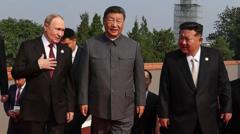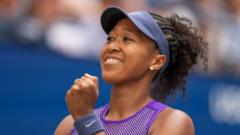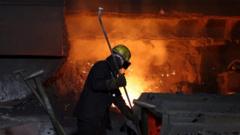Why Can't Imane Khelif Compete in the World Boxing Championships Without a Genetic Sex Test?

Published: 2025-09-03 11:05:18 | Category: Boxing
Imane Khelif, the Olympic boxing champion, faces a significant hurdle in her career as she is barred from competing at the upcoming World Boxing Championships due to new mandatory genetic testing regulations. These measures, introduced by World Boxing, require all athletes aged 18 and over to undergo a PCR (polymerase chain reaction) genetic test to determine their eligibility. The policy aims to ensure fair competition between male and female athletes. However, Khelif has been vocal about her situation, filing an appeal with the Court of Arbitration for Sport (CAS) to lift the ban enforced on her participation.
Last updated: 29 October 2023 (BST)
Key Takeaways
- Imane Khelif is currently barred from competition due to mandatory genetic testing regulations.
- The new rules were implemented by World Boxing in May 2023.
- Khelif has filed an appeal with CAS, seeking to overturn the ban.
- Her hearing date could take several weeks, potentially missing the World Championships.
- Khelif won gold in the women's welterweight category at the 2024 Paris Olympics.
The Controversial New Regulations
The introduction of mandatory genetic testing by World Boxing has stirred up considerable debate within the sporting community. Effective from May 2023, these regulations require all athletes aged 18 and over to undergo a PCR genetic test to confirm their eligibility to compete. The governing body argues that the policy serves to ensure a level playing field, thereby promoting fairness and safety among competitors.
However, the announcement has faced backlash, particularly when Khelif was named specifically in the communications regarding the new rules. World Boxing later issued an apology for this action, acknowledging the potential harm caused by singling out an individual athlete.
Khelif's Response and Appeal
Imane Khelif, a prominent figure in women's boxing, has expressed her frustration and disappointment with the situation. Following her Olympic victory in Paris, where she secured gold in the women's welterweight category, Khelif stated, “I am fully qualified to take part in this competition – I am a woman.” Her assertion reflects her identity and her long-standing experience as a female athlete. Khelif has consistently reiterated her dedication to the sport and her right to compete.
Filing an Appeal with the CAS
In response to her disqualification, Khelif has taken her case to the Court of Arbitration for Sport (CAS). She seeks to have the ban lifted until her appeal can be heard. CAS confirmed her filing, stating that the process is underway. However, reports suggest that the hearing could take several weeks, which puts Khelif at risk of missing the World Boxing Championships scheduled from September 4 to September 14.
The Impact on Khelif's Career
Missing the World Boxing Championships could have serious implications for Khelif’s career trajectory. As a prominent athlete, her participation in such events is crucial for maintaining momentum and visibility in the sport. Furthermore, the controversy surrounding her situation may also have lasting effects on her reputation and future opportunities in boxing.
Historical Context and Previous Controversies
Khelif’s current predicament is not an isolated incident within the realm of sports. The issue of gender eligibility and the inclusion of transgender athletes has been a contentious topic across various sporting disciplines. Khelif was previously banned by the International Boxing Association in 2023 over alleged concerns regarding her gender eligibility. This history adds another layer of complexity to her current situation, drawing attention to the broader implications of gender testing in sports.
What Happens Next?
As the situation unfolds, the sports community will be keenly watching how the CAS addresses Khelif’s appeal. Potential outcomes could range from a swift resolution allowing her to compete, to a lengthy process that might prevent her from participating in upcoming events. The ruling will likely set a precedent for how similar cases are handled in the future, especially regarding the intersection of gender identity and competitive sports.
Broader Implications for Women's Sports
The introduction of genetic testing raises fundamental questions about fairness, identity, and the nature of competition in women's sports. Advocates for inclusivity argue that such measures can be discriminatory, potentially sidelining talented athletes like Khelif who meet the criteria for participation. The discourse surrounding this issue is crucial as it delves into the ethics of sportsmanship, the role of governing bodies, and the experiences of female athletes.
Conclusion
Imane Khelif’s situation is emblematic of the ongoing challenges faced by athletes in navigating complex regulations related to gender and eligibility. As she awaits her hearing with CAS, the outcome will not only impact her career but also contribute to the broader conversation surrounding equity in sports. It raises important questions about how organisations can balance fairness and inclusivity in competitive environments.
As the world of sports continues to evolve, one must ponder: how can governing bodies ensure a truly level playing field while respecting the identities of all athletes? The approach taken in Khelif's case could have lasting ramifications for the future of sport. #ImaneKhelif #WorldBoxing #GenderTesting
FAQs
What is the reason behind the mandatory genetic testing in boxing?
The mandatory genetic testing was introduced by World Boxing to ensure fair competition between male and female athletes, aiming for a level playing field and the safety of all participants.
Why was Imane Khelif banned from competition?
Khelif was banned due to allegations of not meeting gender eligibility criteria as determined by the International Boxing Association, which has raised significant controversy in her case.
What is the Court of Arbitration for Sport (CAS)?
The CAS is an independent institution that resolves disputes related to sport through arbitration. It is often referred to as the "Supreme Court of Sport" and handles cases involving athletes, federations, and other sports-related entities.
What could be the outcome of Khelif's appeal?
The outcome of Khelif's appeal could range from allowing her to compete in upcoming events to upholding the ban, which would significantly affect her career and future competitions.
How long might Khelif have to wait for her hearing?
Reports suggest that Khelif’s hearing with the CAS could take several weeks, which may jeopardise her participation in the World Boxing Championships set for September.



